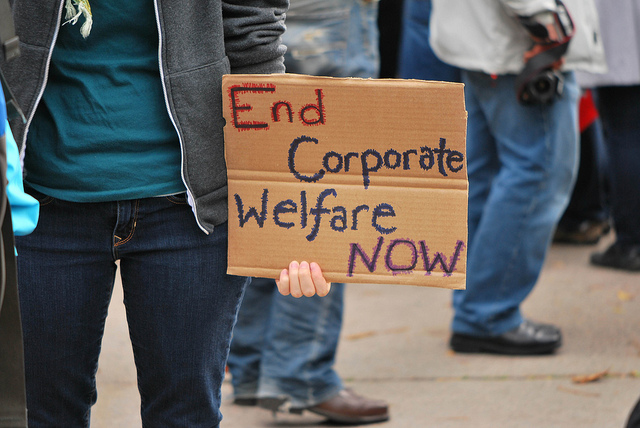Like this article? rabble is reader-supported journalism. Chip in to keep stories like these coming.
“We’re paying [gas] prices similar to when oil was $100,” Bruce Cran of the Consumers Association of Canada told Global News reporter Jamie Sturgeon in August, just as the election got underway.
Motorists know major oil companies keep profits high by rigging prices they pay to fill up. When the oil price falls, profits are registered in gas sales instead of at the wellhead.
Why not keep prices at the pump high? Big Oil controls the production of petroleum, the sale of gasoline, and everything in between. Who is to stop them from abusing their power?
Canadian commuters looking for a break can look to government. An investigation into price fixing by the oil majors would be warmly welcomed by Canadians who drive cars, a significant number of voters.
Yet the failure of oil companies to pass on lower prices to consumers has not been a feature of election 2015.
Parties seeking voters are missing something. Corporate power should be front and centre in the election. Excessive corporate power is not limited to oil pricing: it is what defines the Canadian political economy.
In election 2011, NDP leader Jack Layton, on his way to becoming Leader of the Official Opposition, took on bank profits. Excessive bank charges amount to a bankers tax on savings accounts. Banks charge credit card interest rates in the high teens, and pay basic interest on deposits of less than one per cent.
Major media do not like to probe banking practices because banks can be important advertisers in a declining market for media buys. The same goes for other big players in the Canadian economy: all look to ensure media silence through ad purchases.
Governments have the means of controlling abuses by big business. Instead successive Canadian governments have facilitated the growth in corporate control of public affairs.
Stephen Harper took Canada out of the Kyoto accord on climate change because oil companies were unwilling to change their plans for developing the Alberta sands and exporting Canadian crude oil. Instead of regulating Big Oil in the public interest Stephen Harper make sure it controlled energy policy.
The Temporary Foreign Workers Program grew because Canadian-based companies wanted access to low-wage workers without having to pay workplace benefits. CCPA Senior Economist Armine Yalnizyan calculated that since 2006 there have been more temporary workers admitted to Canada than landed immigrants.
The very nature of Canada as a country that welcomed people to its shores and offered an opportunity for citizenship has been thrown out to meet corporate requirements for cheap labour. Instead of paying a market wage for serving up coffee and doughnuts, companies get counter workers from abroad thanks to Conservative and Liberal subservience to big business. When the temporary work permit is up, the foreign worker has to return home.
A mega trade deal, the American-inspired Trans-Pacific Partnership (TPP) is being negotiated by the Conservatives during the electoral period. The deal envisages the privatization of public services such as the CBC, shutting down future public drug plans, limiting industrial policy measures, and eliminating income support for Canadian farm families.
Overall, the TPP represents everything the U.S. has not yet been able to achieve in previous corporate-inspired trade initiatives, which enshrine business rights in international treaties that supersede domestic legislation.
On Canadian soil, Liberals and Conservative governments have not challenged American corporations who determine the destiny of the country they govern. Who expects them to challenge corporate power in current international trade negotiations?
The Canadian tax system proffers billions of dollars in tax loopholes, subsidies and low rates to corporations. Meanwhile by 2014 nearly $200 billion in Canadian corporate money was stashed offshore, thanks to Canadian law.
All of this public largesse — apparently so corporations can create jobs for Canadians — makes no sense. For a start, corporations are better at eliminating jobs, or moving them offshore, than creating new, well-paying jobs, with careers attached.
The NDP introduce Tom Mulcair as the future prime minister of the government in waiting. The party program addresses social issues. It calls for an increase in corporate taxes. But as the campaign progresses, the party has been losing core support among progressive voters.
Tom Mulcair and the NDP have made a case for environmental re-regulation and for reducing greenhouse gas emissions: giving a social licence to companies to do business in a green era. Maybe the time has come to address the elephant in the election: corporate power.
Regular citizens will pay attention to a leader who wants to defend them against high gas and fuel oil prices, corporate tax cheats, and banks with a hand in their pocketbooks.
Duncan Cameron is the president of rabble.ca and writes a weekly column on politics and current affairs.
Photo: Zhu/flickr
Like this article? rabble is reader-supported journalism. Chip in to keep stories like these coming.



